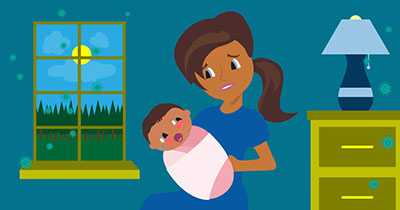Vaccines & Pregnancy: Top 7 Things You Need to Know

#1. You aren’t just protecting yourself–vaccines during pregnancy give your baby some early protection too!
You know that vaccines are meant to protect the person getting the shot against a disease, but during pregnancy, you and your baby are sharing everything, and that even includes disease protection. When you get some vaccines while you are pregnant, your body will create protective antibodies (proteins produced by the body to fight off diseases) and pass on some of those antibodies to your baby. These antibodies will give your baby some short-term protection against whooping cough and the flu (the 2 vaccines recommended during pregnancy) early in life.

#2. If you get pregnant again, you’ll need vaccines again.
One and done doesn’t apply when it comes to vaccines that are recommended for pregnant women. The amount of antibodies that you have in your body after getting vaccinated decreases over time. When you get a vaccine during one pregnancy, your antibody levels will not stay high enough to provide enough protection for future pregnancies, even if your babies are close in age. So make sure you give baby number 2 (and 3 and 4) the greatest number of protective antibodies and the best disease protection possible by getting your whooping cough vaccine each time you are pregnant. You should get the flu vaccine once each influenza season.

#3. Trying to conceive? Better pull out those vaccine records.
If you are thinking that now is the time to grow your family, make an appointment with your doctor to discuss how to have a healthy pregnancy from the start. During this pre-conception checkup, you should ask if you need any vaccines now. For example, are you up to date on your MMR (measles-mumps-rubella) vaccine? This one is important because rubella is a contagious disease that can be very dangerous if you get it while you are pregnant. In fact, it can cause a miscarriage or serious birth defects. The best protection against rubella is MMR vaccine, but you need it before you get pregnant.

#4. Maternal vaccines are very safe…for you and your little one.
From the start, you want to keep your baby safe and protected. That’s why you think about everything you put in your body. It’s important for you to know that the whooping cough and flu vaccines are very safe for you and your baby. All vaccines are held to the highest standards of safety—meaning they are carefully studied and monitored for side effects. Vaccines are like any medicine, which means they can have some side effects. But most people who get vaccinated have no side effects. CDC continually monitors vaccine safety, and the most common side effects they see are mild (redness, swelling, tenderness at the site where the shot was given). That doesn’t seem too bad compared to everything else going on with your body!

#5. Whooping cough can be really dangerous for your baby, and you may not even know he has it.
Whooping cough can be serious for anyone, but for your newborn, it can be life-threatening. Up to 20 babies die each year in the United States due to whooping cough. About half of babies younger than 1 year old who get whooping cough need treatment in the hospital. The younger the baby is when he gets whooping cough, the more likely he will need to be treated in a hospital. You may be thinking that you’ll know your baby is really sick because he’ll be coughing, but many babies with whooping cough don’t cough at all. Instead, it can cause them to stop breathing and turn blue. Help protect him before his first breath by getting a whooping cough vaccine while you are pregnant.

#6. Catching the flu when you are pregnant can lead to serious pregnancy complications.
So, you think you are pretty healthy or maybe you’ve had the flu before, and it wasn’t that bad. Well, changes in your immune, heart, and lung functions during pregnancy make you more likely to get seriously ill from the flu. Catching the flu might also increase your chances for serious problems for your baby, including premature labor and delivery. Get a flu shot if you are pregnant during flu season—it’s the best way to protect yourself from the flu and prevent possible flu-associated pregnancy complications.

#7. Timing is everything!
You know all about timing. Week after week, you are tracking your baby’s growth and development and counting down the days until you meet your little one! When it comes to vaccines, timing is also important. Flu seasons vary in their timing from season to season, but CDC recommends getting vaccinated by the end of October, if possible. This timing helps ensure that you are protected before flu activity begins to increase. Whooping cough vaccine timing is a little different. CDC recommends you get it in your third trimester so that you pass the greatest number of protective antibodies to your baby before birth. This will help keep her protected during her first few months of life, when she is most vulnerable to serious disease and complications.
Related Pages
- Page last reviewed: June 14, 2017
- Page last updated: June 14, 2017
- Content source:


 ShareCompartir
ShareCompartir